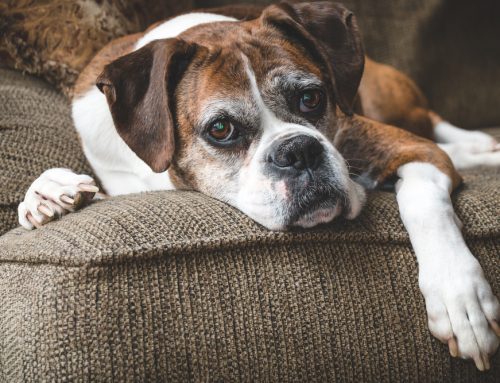As your feline friend meows at you beseechingly, you’re wondering what they’re trying to say. A fresh helping of kitty paté? An extra-long ear rub? Maybe your cat is trying to ask you questions about their dental health. After all, those 30 sharp teeth require special care to ward off dental disease, which occurs in the majority of cats by age 3. No cat enjoys being unable to eat their food, but fortunately for your kitty, our Palmer Vet Clinic team is highly skilled at deciphering the feline language, and managed to interpret your cat’s questions. Here is what we learned when we interviewed your four-legged friend.
Your cat’s question: What is causing my dental disease?
Our answer: We understand how concerned you are about your dental disease, and you’re not alone. Many dogs and cats suffer from periodontal disease, which is generally caused by plaque accumulation and tartar formation as a result of oral bacteria. The invasive bacteria attack your mouth, affecting the teeth and surrounding structures that support and keep them healthy. Plaque begins to form on your teeth only hours after eating, so if you’re not brushing daily, your dental disease will only worsen.
Oh no! I didn’t realize that my dental disease had already begun setting in by the time I grew my adult teeth. I’ll have to be more cooperative when I see my toothbrush come out.
Q: What are the consequences of my dental disease if left untreated?
A: Dental disease doesn’t affect only your breath—it can also harm your heart, liver, and kidneys. As oral bacteria invade your gums, they leach into the bloodstream and travel to major organs, causing systemic disease. Not to mention, dental disease can create painful gingivitis, tooth-root abscesses, bone loss, and enamel issues.
Wow, dental disease is much more serious than I thought. I don’t want my mouth to hurt—especially on Tuna Tuesday—and I certainly want to keep my heart, liver, and kidneys healthy.
Q: What are some common periodontal problems I may experience?
A: Unlike people, cats don’t get cavities because of the tooth shape, but they can experience several other periodontal problems. Without proper dental care, you may develop the following:
- Gingivitis — Gingivitis is the inflammation of the gum tissue surrounding the teeth. The inflamed gum tissue can recede from the teeth, leaving pockets perfect for trapping food, bacteria, plaque, and tartar. These deep pockets often lead to tooth-root abscesses.
- Stomatitis — Stomatitis refers to inflammation inside the oral cavity, and can affect any oral structure. This painful condition appears to be related to an overactive immune system that responds too aggressively to bacteria or other infectious agents in the mouth.
- Feline odontoclastic resorptive lesions (FORLs) — Relatively common in cats, FORLs are an erosion in the tooth’s enamel, often occurring at the gumline. These erosions are incredibly painful, because they expose the tooth’s pulp where the nerve lies. The cause is unknown, and the most effective treatment is extracting the affected tooth.
These dental problems sound like they really hurt! All the more reason to meow at my mom until she schedules my oral health exam with the Palmer Vet Clinic team.
Q: How can my owner tell if my mouth hurts?
A: As you know, cats hardly complain when they’re in pain, although an empty food bowl is a different story. Cats with dental disease generally display such signs as reddened gums, drooling, unusually bad breath, and difficulty chewing crunchy food.
It would be so much easier if my mom could understand me like Palmer Vet Clinic’s team. They know when I’m in pain, or not feeling myself.
Q: How can my owner help keep my mouth healthy?
A: Ideally, your owner should be as dedicated to your dental health as they are to their own—minus the flossing and mouthwash parts. The gold standard for at-home oral health care is daily toothbrushing, but they should brush at least a couple times a week. They can also add dental treats, prescription kibble, water and food additives, and other dental care products approved by the Veterinary Oral Health Council (VOHC).
It’s great to know an organization actually grants approval to dental products that slow plaque and tartar accumulation. I don’t think the last bag of “dental treats” my mom bought did any good.
Q: How can my veterinarian help keep my mouth healthy?

A: Palmer Vet Clinic’s veterinary team loves providing dental care for pets, since they see the huge difference in their patients’ quality of life. Typically, we’ll perform an oral exam during your annual wellness visit, and recommend a comprehensive dental assessment and cleaning based on tartar accumulation, gingivitis, or other noticeable issues. Best of all, all your dental care needs are taken care of while you’re under anesthesia, so you won’t feel a thing.
Whew! That makes me more comfortable, knowing I won’t have to sit there and say, “Ah,” as you clean my teeth. I wouldn’t want to accidentally bite you. Also, waking up with fresh breath will be wonderful.
Is your cat’s breath worse than typical tuna breath? That may be a sign of dental disease. Here at Palmer Vet Clinic, we’ll care for your feline friend as our own, no matter how bad their breath. Call us to schedule an oral health exam for your cat, so you can return to snuggling your furry friend without fear of stinky kisses.








Leave A Comment